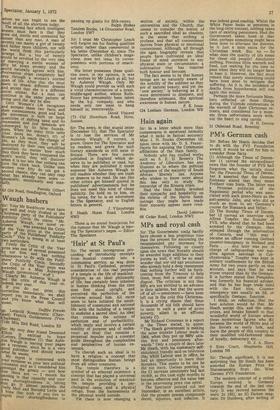' Hair ' at St Paul ' s
Sir: The recent incongruous proceeding of introducing excerpts from musical comedy into a communion service, as was done in St Paul's Cathedral, prompts consideration of the reel purpose of a temple in the life of mankind. Religion, as an ideal philosophy of life, has certainly been inherent in human thinking from the time man first stood upright, and perceived the perfection of the universe around him. All races seem to have initiated the establishment of communal and national life with the building of a temple to enshrine a sacred ideal. An ideal that contains the notions of perfection and of perfectibility, which imply and involve a certain nobility of purpose and of endeavour: an ideal that remains a perpetual impulse and a constant guide throughout the complexities and perplexities of human existence.
To cherish such an ideal is to have a religion: a concept that most distinguishes human beings from all other creatures.
The temple therefore is a symbol of an ethereal existence: a concept that has played a universal part in the evolution of mankind: the temple providing a psy chological oasis, and a physical refuge, from the harassments of the physical world outside.
Yet there is now emerging a section of society, within the universities and the Church, that seems to consider the notion of such a sanctified ideal as obsolete, in the sense that nothing is profane; and that all contentment derives from physical or emotional contentment. Although, all through the ages, biography reveals that people have cultivated an ideal frame of mind unrelated to any physical state or circumstance: a sublimation that has inspired both honour and heroism. The fact seems to be that human beings are as naturally aware of the nobility of the sublime as they are of natural beauty; and yet the ' new society' is behaving as if it were determined to dissipate, and therefore attenuate, this spiritual awareness in human nature. F. E. Isaac














































 Previous page
Previous page